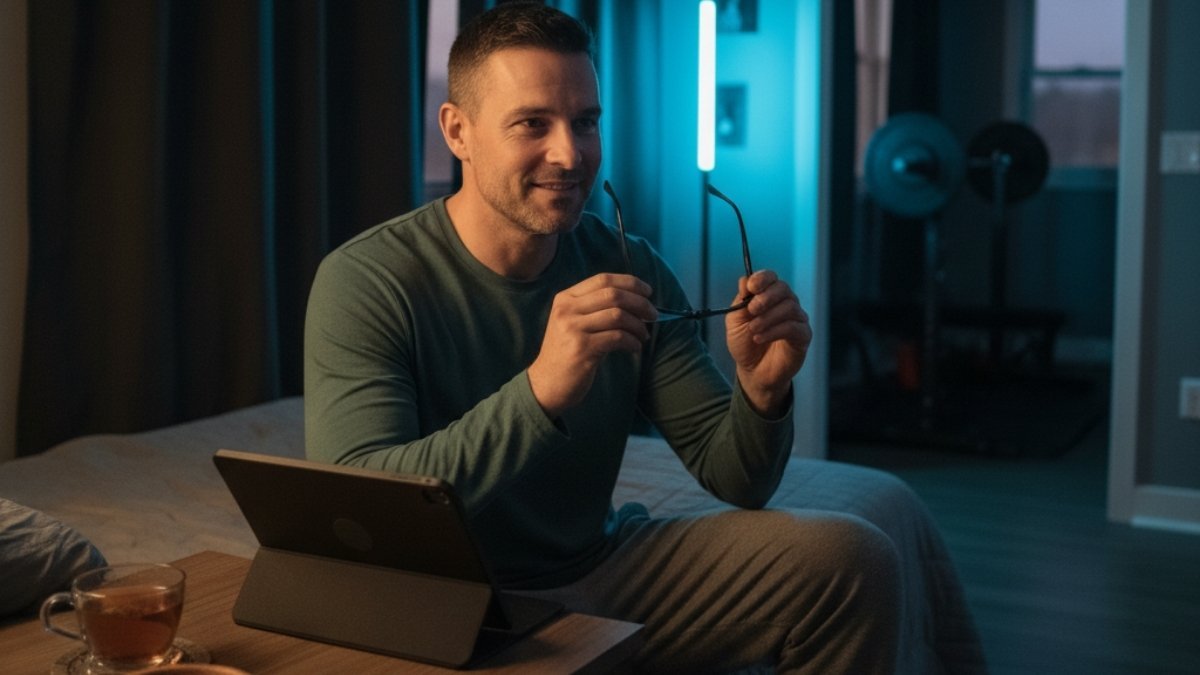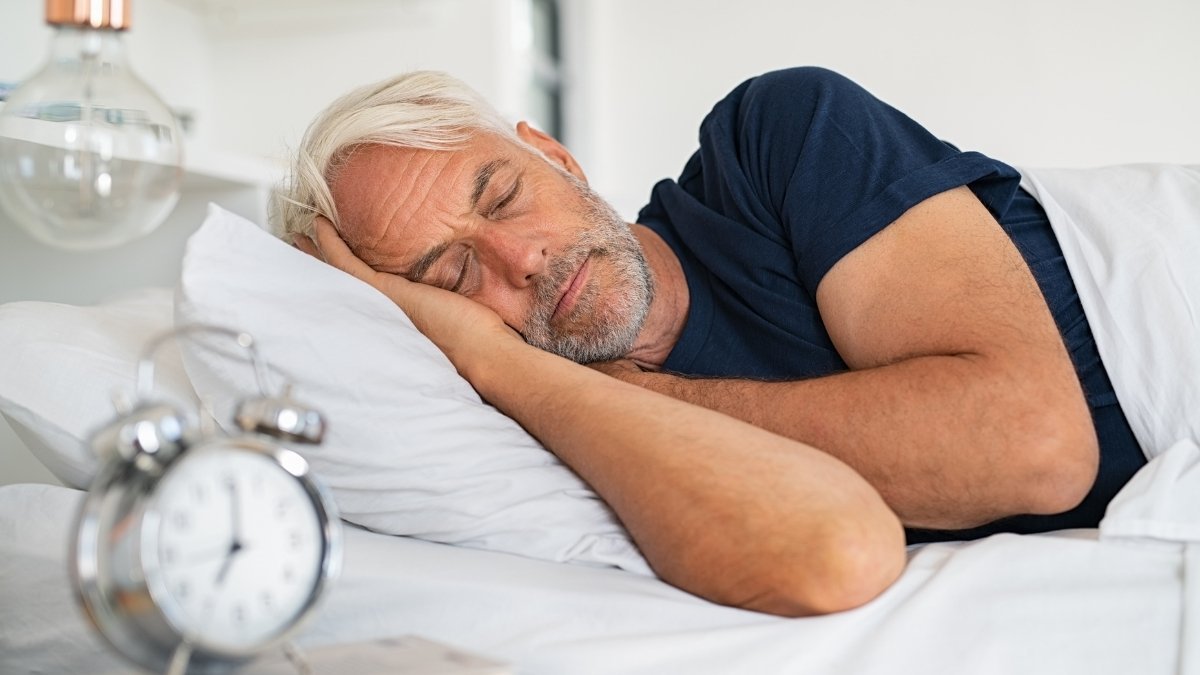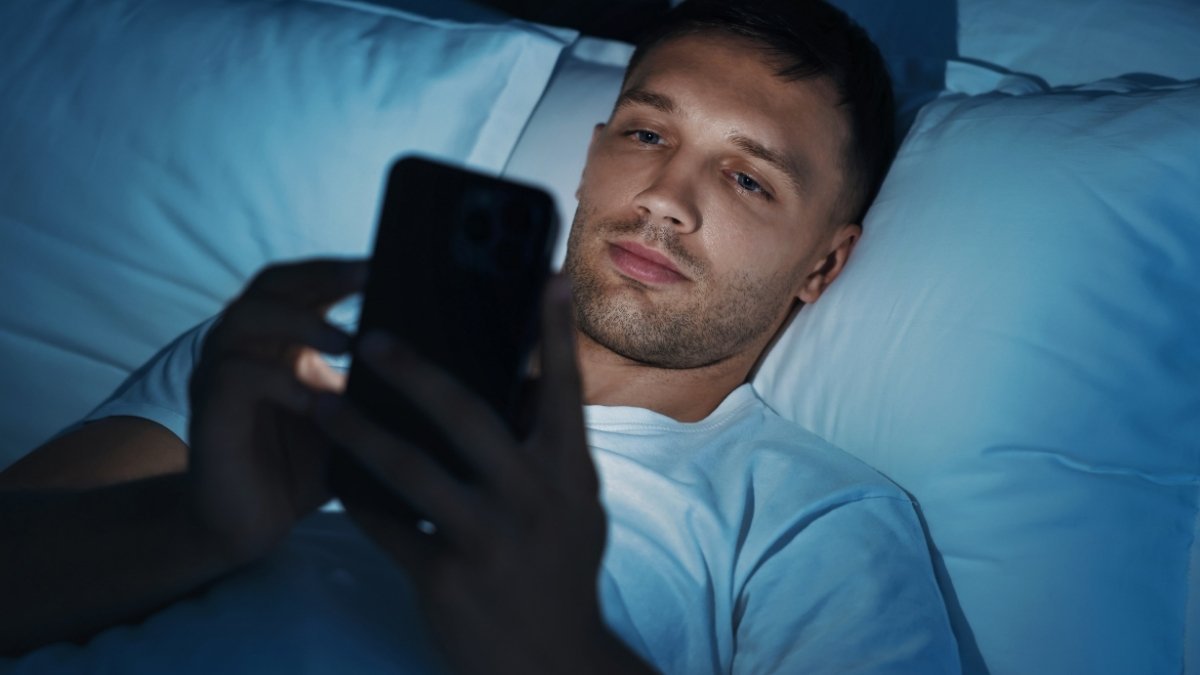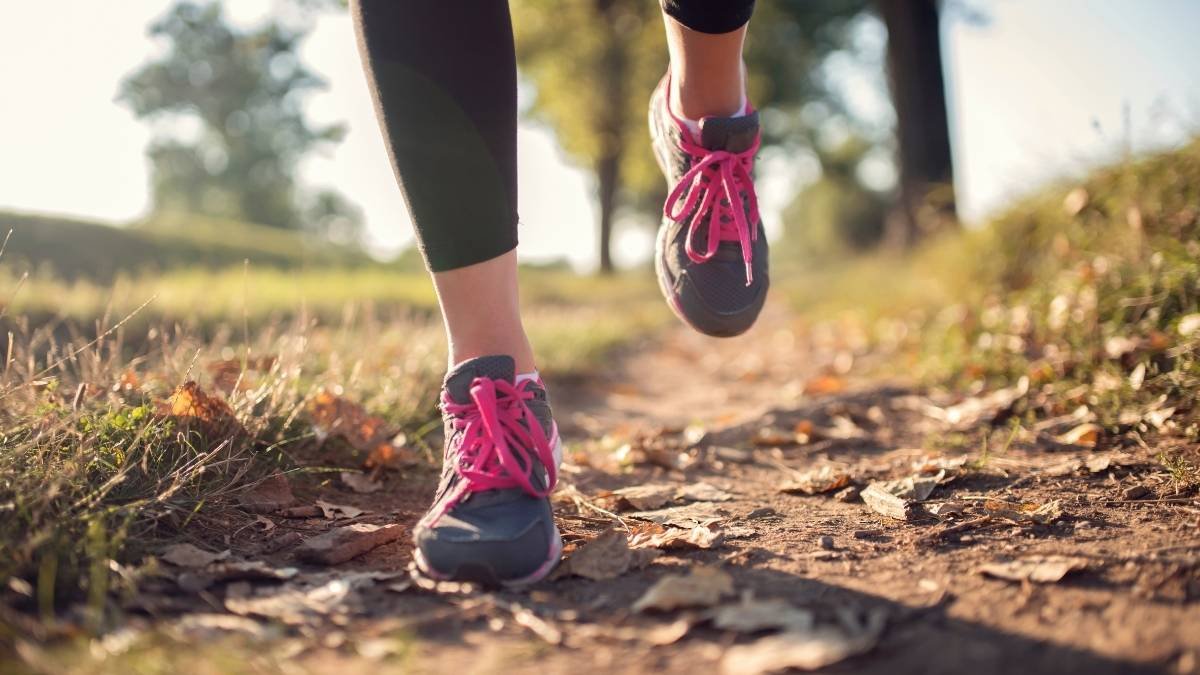
You’re past 35, maybe pushing 40, and something just feels… off. It’s not one big thing. It’s a thousand little paper cuts. It’s the 3 p.m. slump that feels more like a full-body shutdown. It’s the motivation you used to have for the gym, or a project, or even just life, suddenly feeling like it’s behind a thick pane of glass. You can see it, but you can’t quite reach it. Maybe you’re a little moodier, snapping over things that never used to bother you. Your focus at work isn’t as sharp. You feel, for lack of a better word, a step behind your former self.
If any of this sounds familiar, you’re not alone. And you’re not imagining it.
For years, we’ve been told this is just “getting older.” A slow, inevitable decline we’re supposed to accept. But what if it’s not that simple? What if a huge part of this slide is actually driven by a few modern habits, especially the ones that creep in after the sun goes down?

This isn’t about some magic pill or a crazy diet. This is about understanding the quiet battle that happens inside your body every single night. It’s a hormonal tug-of-war, and for a lot of us, the wrong side is winning. But with a few simple, evidence-based tweaks to your evening routine, you can start to tip the scales back in your favor.
Let’s get into it.
First, Let’s Talk About What’s Really Going On

Before we dive into the “how,” we need to get real about the “what.” Testosterone. We hear the word and immediately think of muscles, sex drive, and aggression. And yes, it’s involved in all of that. But calling it just a “sex hormone” is like calling a CEO a mailroom clerk. It’s a profound understatement.
Testosterone is the architect of manhood, a master hormone that builds and maintains you from the ground up. It forges your bone density, regulates how your body uses fat and carbs, drives the production of red blood cells for stamina, and even sharpens your brain, influencing everything from mood and motivation to confidence and concentration. It’s a foundational pillar of your physical and mental well-being.
So when it starts to decline, you don’t just feel it in the bedroom. You feel it everywhere.
And here’s the thing: it does decline. After peaking in your late 20s or early 30s, it starts a slow, steady drop of about 1% per year. This isn’t some myth; it’s a biological reality often called late-onset hypogonadism (LOH).12 While most men stay within the “normal” range (roughly 300 to 1,000 ng/dL), a significant number—anywhere from 10% to 25%—can fall below that threshold.
The problem is, the symptoms are sneaky. Fatigue, weight gain, low mood, brain fog… It’s easy to just blame stress or a busy life. This creates a nasty feedback loop: you gain some weight, which lowers your testosterone. The lower testosterone makes you feel tired and unmotivated, so you exercise less and gain more weight, which lowers your testosterone even more.

But the most important thing to understand is the nightly battle inside your body.
Every evening, a hormonal handover is supposed to happen. Cortisol, the “get-up-and-go” stress hormone that’s high during the day, is meant to take a nosedive. As it falls, Melatonin, the “hormone of darkness,” rises, telling your body it’s time to sleep. This transition is the non-negotiable ticket to the deep, restorative sleep where your body does its most important work: producing the majority of your daily testosterone.
Our modern evenings—lit by screens, fueled by caffeine, and filled with stress—are a direct assault on this crucial handover. We’re keeping cortisol high and melatonin low, creating an internal environment that’s hostile to testosterone production.
The good news? We can fix it. Tonight.
The 7 Evening Tweaks: Your New Game Plan

Think of these seven strategies as a complete system. Doing one is good. Doing a few is better. But doing them together, consistently, creates a powerful synergistic effect that transforms your evenings from a hormone-killing minefield into a testosterone-boosting sanctuary.
🔥 THE T-PROTOCOL: 7 STEPS TO OPTIMAL HORMONE HEALTH
Your Mission: Maximize Natural Testosterone by Mastering Your Evening Habits.
🔬 WHY IT MATTERS (The Simple Science)
Testosterone assembly occurs primarily during **deep sleep**. Interrupting this process with stress (cortisol) or poor lifestyle choices directly impacts production.
👉 CRITICAL STAT: One week of <5 hours of sleep per night can slash T-levels by 10-15%—that’s like aging 10-15 years in 7 days.
Run Your Bedroom Like a T-Factory
Deep sleep is the prime production time for testosterone. This step is non-negotiable for hormone health.
IMPACT: Protect the 10-15% T-loss from poor sleep.
✅ ACTION: Get 7-9 hours. Make the room pitch black, silent, and cool (60-67°F).
Declare a “Digital Sunset”
Blue light from screens signals daytime to your brain, killing the production of the sleep hormone, melatonin, and keeping you wired.
IMPACT: Melatonin must be protected to transition to deep sleep.
✅ ACTION: Power down all screens 1-2 hours before bed. Get blue-light-blocking glasses if absolutely necessary.
Strategic Final Fuel Stop
Minerals like Zinc and Magnesium are the specialized raw materials needed for the body’s testosterone assembly line overnight.
IMPACT: Provides the essential “nuts and bolts” for overnight production.
✅ ACTION: Have a light snack rich in Zinc (pumpkin seeds) and Magnesium (almonds). Avoid heavy meals 3 hours before bed.
Time Your Workout Wisely
Intense exercise (heavy lifting, HIIT) too late at night jacks up cortisol—the stress hormone that directly opposes testosterone.
IMPACT: Keep cortisol low so T-production can rise.
✅ ACTION: Finish intense workouts 2-3 hours before sleep. A light walk or stretching is ideal for the evening.
Manually Flip the “Off” Switch
Chronic all-day stress keeps evening cortisol high, which directly puts the brakes on testosterone production in your testes.
IMPACT: Active stress reduction stops cortisol from suppressing T.
✅ ACTION: Create a 20-30 minute “wind-down” ritual (meditate, deep breathing, journal, read a physical book).
Ditch the “Nightcap” Lie
Alcohol is a grenade in your hormonal system: it’s toxic to T-producing cells, fragments sleep, and increases the conversion of testosterone to estrogen.
IMPACT: Toxic effect on T-cells and estrogen conversion.
✅ ACTION: If you are serious, cut out evening alcohol. Prioritize deep, restorative sleep.
Respect the Caffeine Curfew
Caffeine has a long half-life. That 3 p.m. drink can still be robbing your brain of the deep sleep needed for hormone production hours later.
IMPACT: Caffeine silently blocks deep sleep, halting T synthesis.
✅ ACTION: Make it a hard rule: No caffeine of any kind for at least 8-10 hours before your bedtime.
Tweak 1: Your Bedroom Is Now a Testosterone Factory. Run It Accordingly.

Look, I get it. “Get more sleep” is the most boring, generic advice on the planet. We’ve all heard it a million times. But I need you to hear this differently.
A landmark study out of the University of Chicago took a group of healthy young guys and restricted their sleep to under five hours a night for just one week. The result? Their daytime testosterone levels plummeted by 10-15%.
Let that sink in. The natural, age-related decline is about 1-2% per year. This means one week of bad sleep can hormonally age you by a decade or more. Suddenly, sleep isn’t just about feeling rested. It’s the single most powerful lever you can pull to protect your vitality. The participants in that study didn’t just have lower numbers on a lab report; they felt it. Their energy, mood, and vigor all took a nosedive, mirroring the classic symptoms of testosterone deficiency.
The relationship is a two-way street of misery. Bad sleep tanks your T-levels, and low T-levels can cause insomnia by messing with your body’s stress response. It’s a downward spiral.
So, this is your number one mission. Not just getting more sleep, but getting quality sleep. The magic happens in the deep, slow-wave stages.
- Consistency is King: Aim for 7-9 hours a night. And try to go to bed and wake up at roughly the same time, even on weekends. This anchors your body’s internal clock.
- The Cave Method: Your bedroom has two jobs: sleep and sex. That’s it. Make it pitch black (blackout curtains are a game-changer), silent (earplugs or a white noise machine), and cool. A room temperature between 60-67°F is the sweet spot for optimal sleep.
Tweak 2: Enforce a Digital Sunset

Think of your brain’s master clock like a bouncer at an exclusive club called “Sleep.” For thousands of years, the rules were simple: when it gets dark outside, the club opens. The bouncer lets in the guest of honor, a hormone called Melatonin, who gets the party started by making you feel drowsy.
Then we invented screens.
The blue light blasting from your phone, tablet, and TV is like a guy in a neon shirt trying to crash the party at 2 a.m.. The bouncer (your brain) gets confused, thinks it’s still daytime, and refuses to let Melatonin in. Worse, it keeps the daytime hormone, Cortisol, hanging around.
The result? You’re lying in bed, “wired and tired.” Your sleep gets delayed, the quality is trash, and the whole testosterone-producing party gets canceled. Scrolling in bed isn’t a harmless habit; it’s an active biochemical signal that sabotages the very conditions you need for hormonal health.
- Set a Curfew: One to two hours before bed, all screens go off. No exceptions. Read a physical book. Talk to your partner. Listen to a podcast. Anything but staring into that blue light.
- Hack Your Environment: If you must use screens, turn on “night mode” to warm up the color temperature. Better yet, invest in a pair of dorky-looking-but-incredibly-effective blue-light-blocking glasses. They work. Dim the lights in your house as the evening progresses.
Tweak 3: Strategize Your Final Fueling

Evening nutrition isn’t about cramming in calories. It’s a tactical mission to pre-load your body with the specific raw materials it needs for the night shift. Think of it as stocking the assembly line just before the factory starts humming.
Two minerals are the undisputed superstars here: Zinc and Magnesium.
Zinc is essential for the pituitary gland to send the “make more testosterone!” signal to your testes. A deficiency is directly linked to low T. One study showed that restricting zinc in healthy men caused a significant drop in testosterone, while supplementing it in deficient men brought their levels back up. Oysters are the king of zinc, but pumpkin seeds, beef, and beans are also fantastic sources.
Magnesium is your body’s relaxation mineral. It helps calm your nervous system, preparing you for deep sleep. But it also has a cool trick up its sleeve: it increases the amount of “free” testosterone in your blood. It does this by binding to a protein called SHBG that normally locks up testosterone, leaving more of the good stuff free and available for your body to use. Studies show that magnesium supplementation can significantly boost T-levels, especially in active men. You can find it in spinach, almonds, and—get this—dark chocolate.
And don’t forget healthy fats. Testosterone is literally made from cholesterol. Avocados, olive oil, and nuts provide the fundamental building blocks.
The play here is a small, smart snack about an hour before bed. A handful of almonds and pumpkin seeds. A square of 85% dark chocolate. This isn’t about feeling full; it’s about providing the tools. And please, avoid the giant bowl of pasta or ice cream right before bed. A heavy meal can raise your body temperature and disrupt your sleep just as much as a screen can.
Tweak 4: Calibrate Your Evening Movement

We all know exercise is good for testosterone. Resistance training, in particular—lifting heavy things with compound movements like squats and deadlifts—gives you a nice acute spike. The late afternoon or early evening is often when we feel strongest, as our body temperature and power output peak.
But there’s a catch.
An intense workout is a stressor. A good stressor, but a stressor nonetheless. Your body responds by releasing cortisol. If you’re crushing a HIIT session at 9 p.m., you’re jacking up your cortisol right when it’s supposed to be bottoming out. You’re essentially flooring the gas and the brake at the same time, creating a hormonal traffic jam that kills your sleep and antagonizes testosterone production.
This doesn’t mean you can’t work out in the evening. It just means you have to be smart about it.
- The 3-Hour Rule: Finish your intense workouts—your heavy lifting, your sprints, your CrossFit—at least three hours before you plan to hit the pillow. This gives your body enough time to come down from that high-cortisol state and shift into rest-and-repair mode.
- Late-Night Zen: If you need to move closer to bedtime, think “restore,” not “destroy.” A gentle walk, some stretching, or some light yoga can actually help lower cortisol and prepare you for sleep.
Tweak 5: Activate the Parasympathetic Shift

Ever feel “wired and tired”? Your body is physically exhausted, but your mind is running a mental marathon of work emails, family logistics, and that dumb thing you said in a meeting three days ago.
That feeling, right there, is the signature of high evening cortisol.
Chronic stress is the arch-nemesis of healthy testosterone. It keeps your body stuck in the sympathetic “fight-or-flight” mode, pumping out cortisol, which directly tells your testes to shut down testosterone production. It’s a biological kill switch.
To fight this, you need to manually activate your parasympathetic nervous system—the “rest-and-digest” mode. This isn’t some woo-woo wellness trend; it’s applied neuroendocrinology. You are consciously telling your body it’s safe to power down, recover, and start the hormone production process.
- Build a Wind-Down Routine: For the last 20-30 minutes of your day, do something that requires zero problem-solving.
- Read a real book. Fiction is great for this.
- Journal. Get all the racing thoughts out of your head and onto paper.
- Practice deep breathing. A simple “box breath” (inhale for 4, hold for 4, exhale for 4, hold for 4) can dramatically calm your nervous system in minutes.
- Meditate. Use an app like Calm or Headspace, or just sit in silence and focus on your breath.
This isn’t a luxury. In the modern world, it’s a necessity for hormonal health.
Tweak 6: Re-evaluate the Nightcap

Let’s be brutally honest about the “nightcap.” It’s a lie.
That glass of wine or whiskey might feel like it’s taking the edge off, but from a hormonal perspective, it’s a disaster. While it might make you feel drowsy at first, alcohol systematically dismantles all the hard work you’re trying to do.
Here’s how:
- It’s Directly Toxic: Alcohol is a poison to the Leydig cells in your testes—the very factories that produce testosterone. Even moderate drinking can lower T-levels, and chronic heavy use can decimate them.
- It Boosts Estrogen: Alcohol increases the activity of an enzyme called aromatase, which converts your precious testosterone into estrogen. This is the last thing you want. It throws your hormonal ratio out of whack, which can lead to things like increased body fat.
- It Destroys Sleep Quality: This is the big one. Alcohol sedates you, but it doesn’t give you restorative sleep. It particularly suppresses REM sleep and leads to a fragmented, shallow night as your body metabolizes it. You might be unconscious for eight hours, but you’re not getting the deep sleep required for that testosterone surge.
The “nightcap” is a terrible trade: a few moments of perceived relaxation in exchange for a night of hormonal self-sabotage. If you’re serious about feeling better, this is one of the first things to cut back on, especially in the evening.
Tweak 7: Mind the Evening Stimulants

That 3 p.m. cup of coffee feels harmless, right? A little pick-me-up to get through the afternoon. But caffeine is a sneaky drug with a very long half-life—up to six hours or more for many people.
Here’s the mechanism: all day long, a chemical called adenosine builds up in your brain. Think of it as “sleep pressure.” The more you have, the sleepier you feel. Caffeine works by blocking the receptors for adenosine. It’s like putting a piece of tape over the “low fuel” light in your car. You don’t have more fuel; you just can’t see the warning.
A coffee at 3 p.m. means that at 9 p.m., a significant amount of caffeine can still be actively blocking those sleep signals. Even if you manage to fall asleep, the quality is compromised. It specifically reduces deep, slow-wave sleep—the exact stage where your body releases the most testosterone.
This creates a vicious cycle: you sleep poorly, so you feel tired the next day. You drink more caffeine later in the day to cope, which leads to another night of poor sleep.
- The Caffeine Curfew: This one is simple but non-negotiable. Establish a strict cutoff time for all caffeine: coffee, tea, soda, energy drinks. A good rule of thumb is 8 to 10 hours before your intended bedtime. If you go to bed at 10:30 p.m., your last sip of coffee is at 2:30 p.m. at the absolute latest.
Need More Help? Look Into These.
Changing habits is the most powerful thing you can do, but let’s be real: sometimes a little gear can make the process easier. These aren’t magic solutions, but they are tools that can directly support the tweaks we’ve talked about, helping you build a more robust evening protocol.
1. Blue-Light-Blocking Glasses:

If you absolutely can’t avoid screens in the evening, these are a non-negotiable tool. They filter out the specific wavelengths of blue light that suppress melatonin production, helping your brain get the signal that it’s time to wind down, even if you’re still looking at a screen. The Benicci glasses are a great starting point—they’re affordable, lightweight, and have clear lenses so you don’t have to deal with a heavy orange tint.
2. True Blackout Curtains:

To create that perfect “sleep cave,” you need to eliminate as much light as possible. Streetlights, car headlights, and even moonlight can disrupt sleep quality. NICETOWN curtains are a best-seller for a reason; their triple-weave fabric is designed to block 85-99% of light and UV rays, helping to create the pitch-black environment your body needs for optimal melatonin and testosterone production.
3. A Fan-Based White Noise Machine:

A quiet room is great, but sometimes silence can make small noises (a creaky floor, a distant siren) even more jarring. A white noise machine masks these disruptions with a consistent, soothing sound. The Yogasleep Dohm Classic is a fan favorite because it uses a real internal fan, not a digital recording, which creates a more natural and non-looping sound that’s less likely to distract your brain.
4. ZMA Supplement:

This is a simple way to cover your nutritional bases for two of the most critical minerals for testosterone and sleep: Zinc and Magnesium. A ZMA supplement combines zinc, magnesium aspartate, and vitamin B6 in a formula designed for enhanced absorption. Taking it 30-60 minutes before bed on an empty stomach can support recovery and sleep quality. NOW Sports offers a highly-rated, budget-friendly option that’s a great place to start.
5. Organic Pumpkin Seeds oil:

If you prefer to get your nutrients from whole foods, keeping a bag of high-quality pumpkin seeds (also known as pepitas) in your pantry is a smart move. They are one of the best food sources of both zinc and magnesium. A small handful makes for a perfect evening snack. Terrasoul Superfoods offers a raw, organic, and unsalted version that’s highly rated for its freshness and quality.
Putting It All Together: This Is About a System, Not a Silver Bullet
You don’t have to do all of this perfectly starting tonight. That’s not the point. The point is to understand that these seven tweaks work together. They are a system.
Avoiding blue light makes it easier to get quality sleep. Getting quality sleep gives you the energy to work out. Timing your workout right helps you wind down. Winding down lowers your cortisol, which makes your whole system more receptive to producing testosterone. It’s a virtuous cycle.
This isn’t about finding some mythical fountain of youth or “bio-hacking” your way to being 21 again. It’s about respecting your own biology. It’s about recognizing that the way we live our modern lives is often in direct conflict with the way our bodies are designed to work.
These evening tweaks are a way to bridge that gap. They are a conscious effort to create the right internal environment for your body to do what it does best: repair, restore, and keep you feeling like the strong, vital man you are.
Start with one. The easiest one. Maybe it’s just putting your phone away an hour before bed. Or swapping your evening beer for a cup of herbal tea. Master that. Then add another.
This isn’t a race. It’s a long-term strategy for taking back control. For feeling better, not just for a day or a week, but for the decades to come. You’ve got this






